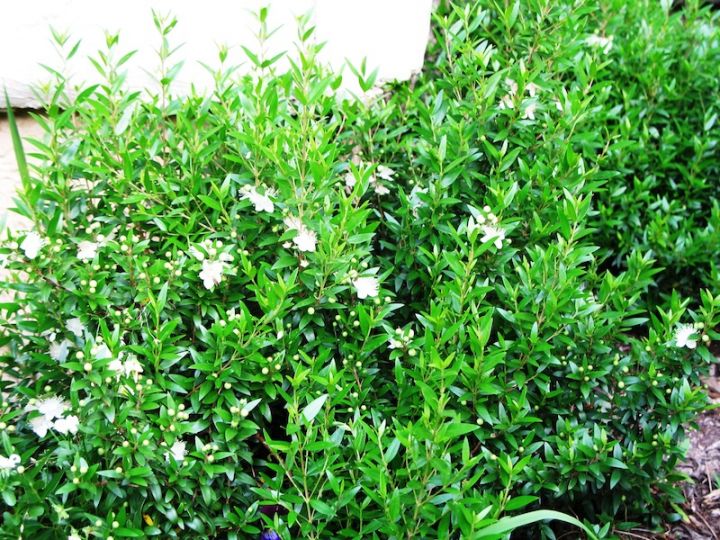Refresh Your Foundation Plantings
September 14, 2015 | By webadmin
Autumn is on it’s way and since it’s the best time to plant new trees and shrubs, we decided to take a look at the plants most people start with when planting their landscapes: Foundation shrubs. You may have noticed there is a lot of repetition around Dallas when it comes to choices of foundation shrubs. So with the changing of the season, we thought we’d provide you with some fresh inspiration and unique alternatives to help you liven up your foundation beds.
Foundation shrubs are an essential part of the landscape as they form a backdrop for your perennials and annual color, and force you to water around the foundation of your home. When you choose evergreen varieties, your foundation shrubs will provide year round interest and color. While we typically see evergreen foliage plants chosen as foundation shrubs, there’s no rule that says you can’t choose varieties with showy blooms. And don’t forget your shady spots. Choose shrubs that will pop in darker areas of the landscape. Often, simply adding some lower growing foundation plants that provide contrasting foliage or blooms is all you need to do.
Here are a few of our favorites to try this fall. All selections are heat tolerant.
Abelia ‘Kaleidescope’ & ‘Rose Creek’ are excellent specimens when looking for a tough, low-growing shrub that loves the sun; but can also take a bit of shade. Abelia ‘Kaleidoscope’ offers up foliage in shades of chartreuse, light green to pale orange in winter with white blooms spring through fall. Their constant blooms are irresistible to butterflies and moths. ‘Rose Creek’ blooms white in spring through fall then the blooms turn a copper-rose color. Both grow about 3-ft tall and 4-ft wide.
__full-width.jpg)
Dwarf Sweet Myrtle, Myrtus communis ‘Compacta', is a unique but beautiful option for a foundation shrub. This aromatic herb offers deep green, dense foliage with fragrant white flowers in summer through fall. Sweet Myrtle loves full sun but will tolerate a bit of afternoon shade. While tolerant of many soil types, the soil must be well draining. A southern exposure is best for dwarf sweet myrtle, as a cold winter on the northern exposure can occasionally cause some tip burn.

Pyracantha, Pyracantha coccinea, is a real show-off come fall and winter. Its bright red berries are not only visually stunning, but adept at attracting birds to your landscape. This large shrub has small, dark green foliage that is a perfect complement to the intense red cascades of berries in winter. In spring, white flowers attract butterflies and pollinating bees. This is a large specimen, so it’s best placed at the corners of a home as an accent where it can spread and show off. Plants can grow to 18-ft tall. Plant in full sun to afternoon shade.
__full-width.jpg)
St. John's Wort, Hypericum androsaemum, is a very low growing plant perfect as a complement to shadier foundation beds. Plants are happy with some morning sun but should be shaded in the afternoon. Plants have a rounded form and purplish green foliage. In summer, it produces bright yellow starburst like flowers, followed by dark red berries in winter that turn black with age. Grows 1.5-ft tall by 3-ft wide.
__full-width.jpg)
Oak Leaf Hydrangea is an excellent foundation shrub that complements shady beds and makes a big impact with large white blooms. Oak leaf hydrangea is a Texas tough shrub that is heat and drought tolerant, unlike many other hydrangea varieties. Feed spring and fall, lightly prune after all the blooms are gone in late fall or early winter.
__full-width.jpg)
Mahonia ‘Soft Caress’ is a soft, willowy shrub for shade. It has evergreen, bamboo-like foliage that creates the perfect backdrop for spikes of bright yellow flowers in fall and winter. Grows 3-ft tall x 3.5-ft wide.
__full-width.jpg)
For other plant ideas, see our past posts here and here. Happy planting!
